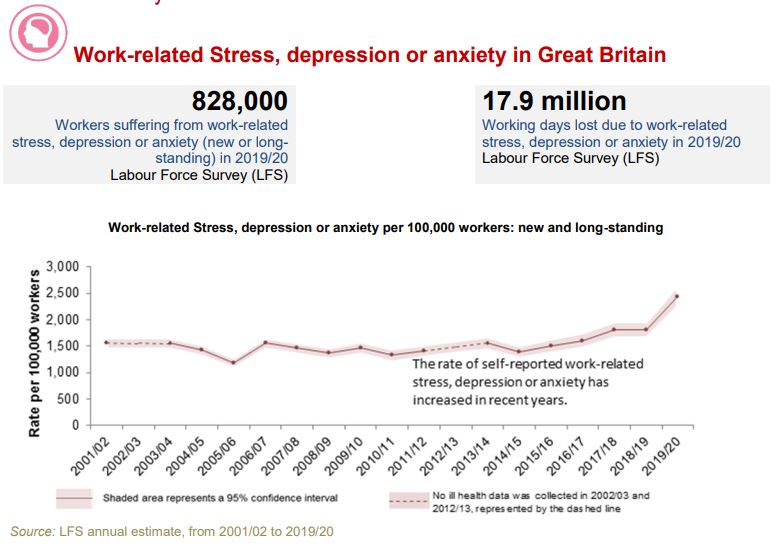Yesterday I was looking at some worrying statistics about stress in Great Britain, where, as almost everywhere in the world, the work-related stress, depression or anxiety numbers recorded an upward trend.
Almost 18mn working days were lost in 19/20 in GB due to work-related stress, depression or anxiety, with more than 0.8mn workers being affected. I wonder how much did these numbers increase in 20/21…
On the other hand, I could not stop wondering: how many organisations actually invest in increasing resilience and implementing stress prevention strategies?

And then I remembered one really good framework I’ve learnt during my NeuroMindfulness Coach Certification Programme, which I’ve done last year: The BMR Framework for Resilience, created by my friends Veronica and Arnaud at the NeuroMindfulness Institute.
The framework is based on scientific research, ancient wisdom they’ve received during their time in ashrams, and many years of working with leaders all around the world.
The 10 practices in the framework contain both habits that can be easily implemented, as well as others that will require more time and effort.
The 10 healthy habits are grouped in three areas, easy to remember: Body, Mind and Relationships.

Body
- Sleep: one of the first good habits we need to implement for our body, is a good quality and long enough sleep: we all need between 7-9h of sleep per night, in order to ensure brain health and emotional balance. The myth of the executive sleeping 3h per night and being performant and maintaining their health over time is exactly that: a myth… (I strongly recommend Matthew Walker’s book “Why we sleep” for a wake up call regarding the importance of sleep).
- Nutrition: our body is composed of what we eat, so we need to make sure we focus on healthy food and stay away from snacking and junk food. We also need to hydrate well.
- Exercise: another important factor in resilience. It leads to the production of BDNF (Brain Derived Neurotropic Factor), a growth factor found in the brain, which has been found to improve mood and response to stress (as well as neuroplasticity).
- Breathing: whenever we are stressed, we should try deep, slow breathing and some breath retentions, as these oxygenate the brain and calm down the stress response. When we feel stressed we should use abdominal breathing and apply the 4 / 8 / 8 rule (inhale on the count of 4, hold the breath with full lungs on the count of 8 and exhale on the count of 8). It is very important that the exhale is longer than the inhale, as this has been proven to help us calm down.
Mind
- Self-Compassion: in our busy work and personal lives, the best way to show compassion to ourselves is to remove the guilt of not being at 100% of our productivity in difficult times. Another way of approaching it would be to treat yourself with the same kindness as you would treat a friend.
- Growth Mindset is another healthy habit to cultivate resilience. It can be translated as the belief that we are in control of our skills, and we all have the capacity to learn and grow. A growth mindset will help us turn stress around by always reflecting on what we can learn from the experience.
- Mindfulness reduces the burden of ruminating about past stressors or worrying about future stressors. Three 3 meditation practices that were strongly recommended during the course were: Body scan, Follow your breath, Loving-kindness meditation.
- Cultivating Gratitude: Gratitude frees us from toxic emotions and it helps us even if we don’t share it. People who cultivate gratitude practices show a more positive affect and less negative affect, a more optimistic outlook on life, a more pro-social behaviour and better sleep (Source: R. Emmons, M. McCullough, “Counting Blessings vs. Burdens: an experimental investigation on gratitude and subjective well being in daily life”, Journal of Personality and Social Psychology, 2003).
Relationships
- Strengthen Human Relationships will help us to increase our resilience. We can do that by connecting with our dear ones in meaningful ways, by offering our full presence, active listening and our compassion. Activating the “tend and befriend” response can also have the same positive impact on our resilience – with our kids, friends, family members and teams.
- Cultivating Pro-Social Qualities, such as gratitude, forgiveness, compassion and altruistic joy. They are really good for well-being, including for improving the quality of our sleep.
To make things easier, I invite you to start by implementing two or three of these healthy habits (or add them to your existing ones). For example, you can introduce a new daily practice, such as:
- A gratitude practice (Mind)
- Giving up sugar (Body)
- Sleeping 8h/night (Body)
- Calling a friend when you feel alone (Relationships)
- Going out for a walk (Mind and Body)
- Watching less TV… (Mind)
… and take it from there. Persevere, and then maybe add a new practice, so that soon you will cover all three areas of the framework.
Please write in the comments below what healthy habits you have or you plan on implementing to increase your resilience. I’d love to find out!
Thank you for reading,
Magda.


